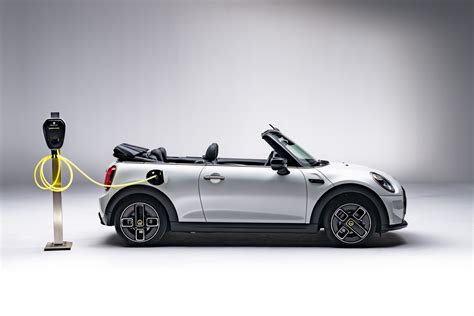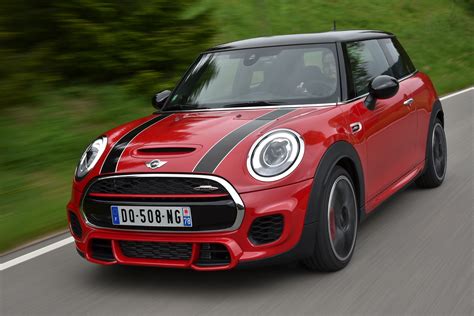Mini Cooper works problems

John Cooper Works (JCW) is a British car marque now owned by BMW and it is an in-house tuning, development, and international automotive racing division for Mini vehicles. It was founded in 2002 by Michael Cooper, son of John Cooper, the racing car maker and tuner responsible for the original Mini Cooper.
In 2007, German automaker BMW acquired the rights to the name, and it bought out the company in 2008.
JCW Tuning
Cooper
The first ever JCW kit was a 126 bhp (94 kW) upgrade for the Mini Cooper. The kit consisted of the following components:
- Flowed and ported cylinder head
- Air filter
- Cover injection tube
- Uprated exhaust (from the catalytic converter back)
- Remapped ECU
- Decorative emblems
Despite its price tag of over €2000, this kit only offered a power increase of 11 bhp (8.2 kW), a sportier exhaust note and a crisper throttle response. The main advantage was that these improvements, though fairly minor, could be made to the Cooper without jeopardizing the factory warranty. In 2004, JCW discontinued the Cooper kit and introduced a Sound Kit for the Cooper. The Sound Kit consisted of a unique air intake system, cat-back exhaust and an ECU remap.

Social links
Mini Cooper works model years

Common Mini Cooper works problems
Common Problems with MINI Cooper Works Cars Based on Owner Complaints:
- Coking of Inlet Valves: Second-generation MINI models are prone to coking of the inlet valves due to carbon buildup, a result of using direct injection for performance and economy. This can cause poor acceleration and sluggish performance, necessitating engine decoking to resolve the issue.
- Coil Pack Failures: Failing coil packs in the engine can result in a lack of power and misfiring. These components are crucial for creating a strong spark, and if they fail, they need to be replaced to restore proper engine function.
- High-Pressure Fuel Pump Problems: Owners of Cooper S models should be wary of high-pressure fuel pump failures, which can manifest as engine surges while driving, poor starting, and rough running. Replacing the high-pressure fuel pump is the only solution to address this issue.
- Bypass Valve Concerns: Checking the condition of the bypass valve is essential for Cooper S and JCW models. Made of plastic, this component can deteriorate over time, impacting the car's performance. Ensuring the bypass valve is in good condition is crucial for optimal engine function.
- Transmission Issues: While manual transmission problems are less common due to the use of stronger German-made Getrag transmissions, issues like sloppy gear shifts and worn linkages can occur. Additionally, clutches may wear out quickly, leading to slipping during acceleration in high gears.
- Oil Leaks and Consumption: Some MINI Cooper models, particularly the first and third generations, are prone to oil leaks and excessive oil consumption. Regular oil changes and potential replacement of the oil pump solenoid valve are recommended to prevent engine problems related to oil issues.
These common problems highlight the importance of regular maintenance and prompt attention to any issues that arise to ensure the longevity and performance of MINI Cooper Works cars.

What is the most common problem with a Mini Cooper?
Turbo failures are common due to high oil change intevals recommended by MINI. Don't go beyond 7500 with synthetic regardless of what MINI said or says. At one time they were recommending 15,000 oil changes and as a results tens of thousands of turbos failed due to crappy thin oil or NO oil.
Is a Mini JCW a good car?
Overall verdict on the MINI John Cooper Works
Yet even with its power output set to one side, the JCW is still one of the most entertaining, characterful and well-made hot hatches on sale, let down only by its high price and less than impressive practicality."
Which Mini to avoid?
Important Points to Know
The Mini Cooper Years To Avoid are 2001–2006, 2002–2008, 2007–2011, 2008–2010, and 2011–2016. Each troubled year had specific recurring issues such as power steering pump failures, transmission problems, timing chain tensioner failure, engine mount problems, and turbocharged engine issues.
Which Minis have timing chain issues?
The following BMW Mini Cooper models are affected by the timing chain recall:
- Mini Cooper Hardtop 2007-2010.
- Mini Cooper Clubman 2008-2010.
- Mini Cooper Convertible 2009-2010.
Percentage distribution of complaints by Mini Cooper works years
We have researched Mini problems and analysed all the complaints filed against Mini Cooper works cars and compiled the top 1 most problematic Mini Cooper works model years:
Below you can see the percentage distribution of known problems by Mini Cooper works model years.
Distribution of the number of complaints by Mini Cooper works years
We've also compiled a chart for you with the number of complaints about Volkswagen Jetta cars of certain model years:
Mini Cooper works car problems categorized by type of issue
After analysing all complaints related to Mini Cooper works , it was concluded that the most common issues with these cars are:
- Power train problems
- Electronic stability control (esc) problems
- Service brakes problems
The graph below shows statistics for all Mini Cooper works vehicle components and the number of complaints received.
The NHTSA has received 1 complaints about various vehicle components related to the Mini Cooper works . Below are the 25 most recent complaints reported for Mini Cooper works vehicles.
List of Mini Cooper works complaints
Mini Cooper works 2014
- Date Of Incident: 2017-10-29
- Date Complaint: 2017-11-02
- Components: POWER TRAIN,ELECTRONIC STABILITY CONTROL (ESC),SERVICE BRAKES
- Summary: ABS, ACSM CRASH SAFETY CONTROL MODULE, EMERGENCY BRAKE, ACC CRUISE CONTROL, MID LEVEL AND SPORT MODE INOPERABLE ONLY FUNCTIONS IN GREEN MODE WITH SEVERE LIMITATIONS THAN FROM BEFORE THIS OCCURRED. IGNITION, ACCELERATION, TOP SPEED... ALL OF THESE ARE AFFECTED AND MY CONCERN IS NOT ONLY THE SOFTWARE AND THE ACSM BUT BECAUSE THE DRIVE HAS CHANGED SIGNIFICANTLY I BELIEVE IT COULD BE MORE OF A PROBLEM THAN A SOFTWARE UPDATE AND THE ACSM. I WAS TRAVELING/IN MOTION ON A CITY STREET AT 45MPH IN GREEN MODE AND ACC ACTIVATED. I LIVE IN ARKANSAS, THE STREETS ARE WINDING CURVY ROADS JUST LIKE I PREFER MY ASPHALT AND DRIVE TO BE HOWEVER I HAVE NEVER EXPERIENCED ANYTHING ELSE THAT HAS CAUSED THIS MUCH CONCERN AND I HAVE NOT "DUKES OF HAZARD" MY MINI. I HAVE NOT BEEN IN AN ACCIDENT OR RECEIVED ANY DAMAGE TO THE VEHICLE.
Are you having problems with your Mini Cooper works?


